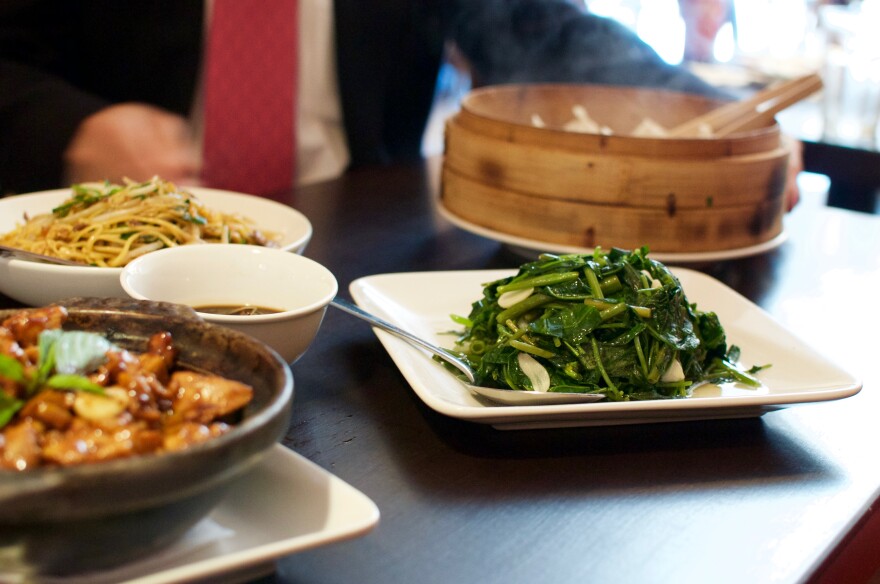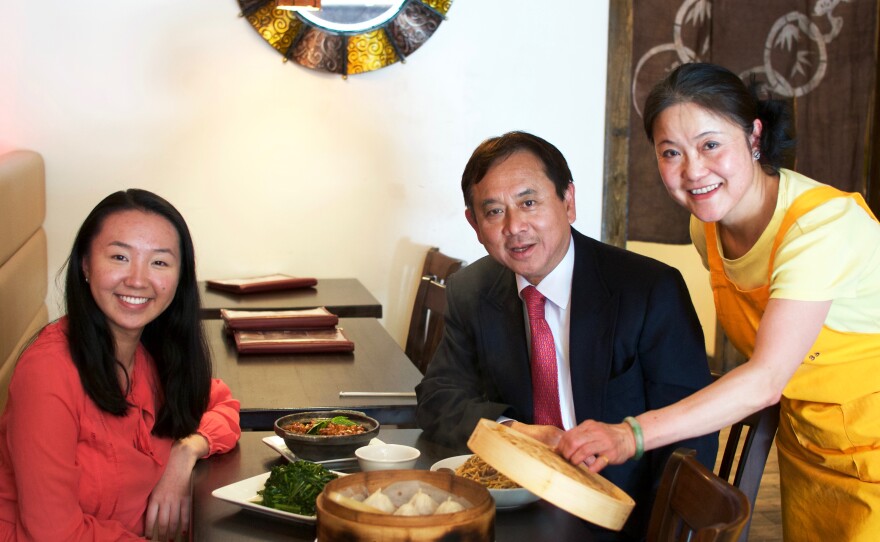Chopsticks clink against bowls over hushed conversations in Chinese, as the unmistakable smells of stir fries and rich sauces greet customers at the door of the Taiwanese bistro, Café 33, in Squirrel Hill.
Meiching “Jenny” Tao, the cafe's owner, seemed to be in several places at the same time, taking orders, serving food and working the cash register.
She served bubble tea, a popular Taiwanese drink consisting of sweet milk tea and tapioca balls, while organizing her employees. She recommended pea shoots to a table of customers and proudly announced that she picked out the vegetables herself at the market that same morning.
Once the stir fried pea shoots in garlic were served, the customers looked delighted. They attempted to use chopsticks at first, but struggled and ultimately asked for forks. As one of her employees left in search of the utensils, Tao joked with the customers: “You can have a fork, but I’ll charge an extra dollar.”

Tao moved to Pittsburgh from Taiwan in the 1990s and said she doesn’t plan on leaving any time soon. She followed her husband here for a job and said she has always felt the city was very accepting of her presence.
Originally, Tao and her husband started the restaurant with the idea to have a small, family-oriented place to make ends meet and they opened Café 33 in 2016.

“I’ve spent most of my life in the restaurant business, so it’s always been my dream to open my own place,” Tao said. “I’m so grateful the restaurant has become so successful and I really hope to stay in Pittsburgh and continue running it.”
Tao is part of a growing group of Chinese and Taiwanese immigrants who have chosen to open their restaurants in the city
There are more than two dozen Asian restaurants in Squirrel Hill, which together with Shadyside and Oakland had the highest percentage of Asian residents in 2010 ranging between 15 and 20 percent.
In 2011, Asians represented 4.68 percent of Pittsburgh’s population. In 2015, it increased by 25 percent to 5.94, according to the U.S. Census Bureau. Pittsburgh has also strengthened ties to China, as Allegheny County officials recently visited the country and procured a deal with Caissa Touristic to offer nonstop flights between Pittsburgh and China.
These restaurants serve authentic cuisine, meals honest to the culture from which they derived. Tao said part of this increasing demand has been created by Chinese students flocking to the top-tier schools in Pittsburgh and American-born Chinese residents.
While about half Tao’s customers are those familiar with her food, she’s also noticed an equal interest from non-Asian Pittsburghers. For these patrons, she’s flexible with her menu.
“I try to keep my dishes as authentic as possible, but if the customer really wants it, I can make changes for them," she said.

Dr. Yueming Yu, an assistant professor of Chinese Studies at Carnegie Mellon, said that Chinese culture revolves around the food. She said that its importance can be traced back to Confucianism, Taoism and Buddhism.
“It’s not just to fill your stomach,” said Yu. “In Chinese, we call it 色香味型俱全 sè xiāngwèi xíng jùquán, which translates into color, smell and taste. First is the color, so make dishes look appealing. Then, when you get nearer, you notice the smell which makes you want to try it. Then, of course, it has to taste good.”
On top of that, in Chinese cooking, the benefits of the individual ingredients are factored into creating a healthy meal.
“In China we say 食疗shí liáo, which means to treat a disease with food,” said Yu.
For example, Yu said there are “cold” and “warm” foods which should be consumed in varying amounts depending on the season to keep the body healthy and in balance.
Dr. Freddie Fu, chairman of the Department of Orthopedic Surgery at UPMC, recalled that when he first moved to Pittsburgh, authentic Chinese restaurants were hard to find.
“I remember in the '70s when I went to this restaurant called Peking Royal Kitchen in Squirrel Hill. On Sundays they would only have four portions of hé fěn (a rice noodle dish) and that was it,” Fu said.
Fu said he’s since seen the restaurant scene expand and improve. He said he often takes his friends to experience what he calls “real Chinese food” at places like Café 33. He encourages them to try his favorite dishes, like soup dumplings, and shows them how to use chopsticks properly. He said that in order to respect another culture, you must learn about it first.

“You have to think outside of the box,” Fu said. “Life is full of different priorities and one should not have the time nor the energy to disrespect other cultures.”
Food is communication, Tao explained, and a way to create understanding between different cultures. Challenging her customers to use chopsticks is just one way Tao tries to get westerners to experience her native cuisine.
“I want to share and teach about culture, because it’s an important part of who I am,” said Tao.

This is reflected in Tao’s special dish, farmer’s noodles, which she said represents her childhood home in Taiwan. It was the go-to lunch dish that wives would bring out to their husbands in the rice fields. She said with every Farmer’s Noodles she serves, she is serving a piece of her childhood.
Anna Wan, a senior at Taylor Allderdice High School, said Chinese food and the restaurants in Pittsburgh have helped her and other American-born Chinese connect with their culture.
“A lot of kids I interact with at Chinese school are the children of restaurant owners and it’s great to see they’re very proud of that,” Wan said.
Still, Wan, who has written about being American-born Chinese, has strong feelings about Americanized Chinese food.
“I hope that in the future, different steps will be taken towards being more authentic," Wan said. "I think that will be tied with also accepting real Chinese culture as a whole rather than a very compromised and white version of it.”
Yu said she, too, wouldn’t mind a reversal of Americanizing Chinese food.
“The more people here learn about Chinese culture and food, the more I hope it will have an effect on American food. They can learn to make their food healthier and tastier,” said Yu.








